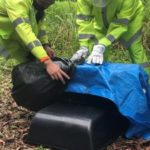A Hilo resident recently caught a skunk in a trap while attempting to catch mongoose on his property near Keaukaha. The skunk is believed to be the same one first spotted by stevedores at Hilo Harbor last December. Since then, the skunk has eluded capture despite multiple intensive night searches by the inspectors from the Hawai‘i Department of Agriculture Plant Quarantine Branch (HDOA-PQB) and the U.S. Department of Agriculture – Wildlife Services (USDA-WS).
Chris Owens of Laehala Street found the skunk while checking traps he set out to catch mongoose that were raiding his chicken coop. He immediately contacted officials and inspectors from HDOA-PQB were dispatched and retrieved the skunk which had to be put down to test for rabies at a mainland laboratory. Owens, who had just recently begun trapping mongoose, said he used teriyaki chicken as bait.
On Dec. 7, 2022, stevedores at Hilo Harbor reported the sighting of a skunk as a cargo ship was being unloaded. The next day, a skunk was reported near Hilo Airport and a rapid response team involving HDOA-PQB and USDA-WS set multiple traps, night-vision cameras and conducted night searches over the course of multiple weeks, but the skunk was not spotted or captured. The crew then moved the search activities to the nearby Hilo Transfer Station in case the skunk moved there but the skunk was not sighted there.
On January 28, a skunk was reported running around the Naniloa Golf Course on Banyan Drive and on February 1, a skunk was reported in Keaukaha. HDOA-PQB staff responded to each of the subsequent sightings conducting night searches and setting traps, but no signs of a skunk were detected.
Skunks are prohibited in Hawai`i as they are avid egg-eaters and would pose a threat to Hawai‘i’s native ground-nesting birds if they become established. They inhabit the mainland U.S., Canada, South America, Mexico and other parts of the world. In the U.S., they are recognized as one of the four primary wild carriers of rabies, a fatal viral disease of mammals that is often transmitted through the bite of an infected animal. Hawai`i is the only state in the U.S. and one of the few places in the world that is free of rabies.
Live skunks have been previously spotted by stevedores and captured at Honolulu Harbor in February 2018, January 2021, July 2021, June 2022. On Maui, a live skunk was captured at Kahului Harbor on December 2020 and one was captured at a trucking company in August 2018. Also on Maui, the Department of Land and Natural Resources captured a skunk at Kanahā Pond State Wildlife Sanctuary in August 2022. All previously captured skunks have tested negative for rabies.
Sightings or captures of illegal and invasive species should be reported to the state’s toll-free Pest Hotline at (808) 643-PEST (7378).
Photo credit: Chris Owen/Department of Agriculture
